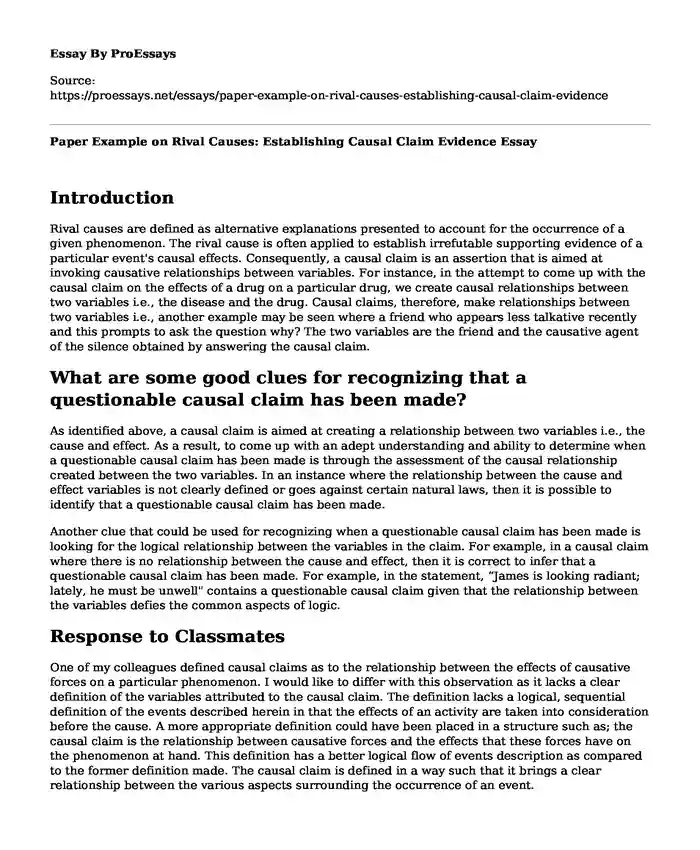Introduction
Rival causes are defined as alternative explanations presented to account for the occurrence of a given phenomenon. The rival cause is often applied to establish irrefutable supporting evidence of a particular event's causal effects. Consequently, a causal claim is an assertion that is aimed at invoking causative relationships between variables. For instance, in the attempt to come up with the causal claim on the effects of a drug on a particular drug, we create causal relationships between two variables i.e., the disease and the drug. Causal claims, therefore, make relationships between two variables i.e., another example may be seen where a friend who appears less talkative recently and this prompts to ask the question why? The two variables are the friend and the causative agent of the silence obtained by answering the causal claim.
What are some good clues for recognizing that a questionable causal claim has been made?
As identified above, a causal claim is aimed at creating a relationship between two variables i.e., the cause and effect. As a result, to come up with an adept understanding and ability to determine when a questionable causal claim has been made is through the assessment of the causal relationship created between the two variables. In an instance where the relationship between the cause and effect variables is not clearly defined or goes against certain natural laws, then it is possible to identify that a questionable causal claim has been made.
Another clue that could be used for recognizing when a questionable causal claim has been made is looking for the logical relationship between the variables in the claim. For example, in a causal claim where there is no relationship between the cause and effect, then it is correct to infer that a questionable causal claim has been made. For example, in the statement, “James is looking radiant; lately, he must be unwell" contains a questionable causal claim given that the relationship between the variables defies the common aspects of logic.
Response to Classmates
One of my colleagues defined causal claims as to the relationship between the effects of causative forces on a particular phenomenon. I would like to differ with this observation as it lacks a clear definition of the variables attributed to the causal claim. The definition lacks a logical, sequential definition of the events described herein in that the effects of an activity are taken into consideration before the cause. A more appropriate definition could have been placed in a structure such as; the causal claim is the relationship between causative forces and the effects that these forces have on the phenomenon at hand. This definition has a better logical flow of events description as compared to the former definition made. The causal claim is defined in a way such that it brings a clear relationship between the various aspects surrounding the occurrence of an event.
I agree with one of my colleagues, who we appear to hold a similar definition of the causal claim. He defined causal claim as an assertion that is aimed at invoking causative relationships between variables; thus, causal claims make relationships between two variables predominantly cause and effect. My colleague and I, therefore, share similar viewpoints when it comes to the definition of a causal claim, which I concur with.
Cite this page
Paper Example on Rival Causes: Establishing Causal Claim Evidence. (2023, Sep 19). Retrieved from https://proessays.net/essays/paper-example-on-rival-causes-establishing-causal-claim-evidence
If you are the original author of this essay and no longer wish to have it published on the ProEssays website, please click below to request its removal:
- Addressing Problems of the ESL Students
- Education Essay Example: Seven Principles of the Best Learning Experience
- SWOT Analysis for Memorial Cancer Institute. Critical Thinking Example.
- Twos Paint With Water-Mark Versus Medium Review
- Literature Review: Benefits of Early Childhood Education
- School Experiences Essay Example
- Annotated Bibliography: Parental Involvement and Academic Achievement







